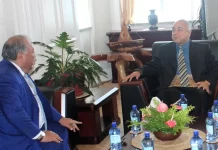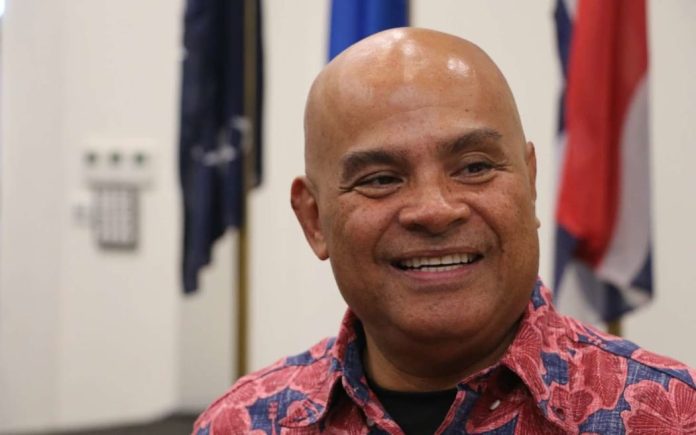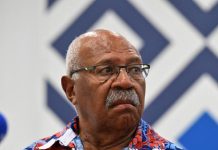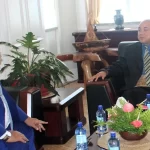A month before national elections in the Federated States of Micronesia (FSM), President David W. Panuelo has visited Washington to lobby and secure top-line funding support for the FSM under the Compact of Free Association.
The eleventh hour trip was to ensure the U.S Executive branch include FSM’s request in its annual budget submission to the U.S Congress in early February, according to a government statement released Tuesday.
“This is not a trivial matter, the U.S President’s budget is submitted in early February, and not having these figures secured would mean delaying the FSM’s movement on Compact-related issues for another year at best.”
While the Republic of Palau and the Republic of the Marshall Islands have signed Memorandums of Understanding (MOUs) with the United States Government, the FSM has not yet reached that point, said the government.
“When I reflect on this administration and the vast responsibility of the Office of the President, I told myself that given the narrowing window on this, I must take decisive action for our people. I am willing to put it all on the line—and to risk my political career by taking bold action… to secure a deal in our nation’s best interests, and the best interests of our citizens,” said President Panuelo.
Contemporary Sector Grant assistance under the Compact of Free Association is approximately US$80 million per year and is increased to approximately US$93 million if one includes the Supplemental Education Grant (SEG), which is an annual act of the U.S Congress as opposed to funding secured through the treaty.
The government statement said President Panuelo successfully secured from the White House team the approval to request US$140 million per year in Sector Grant assistance, or a total of US$2.8 billion over a twenty-year period.
The FSM Compact Sector Grant funding resides within the FSM’s States, and not at the FSM National Government. One of the impacts of such an increase in funding would be a dramatic jump in financial support to the State Governments in Yap, Chuuk, Pohnpei and Kosrae.
“This is one of the ways that teachers get their salary increases so that we can retain talent and strike back at our 2% annual out-migration rate by improving student learning opportunities at home,” President Panuelo said,
“And this is how we can provide better pay to doctors and nurses employed at the state level, all while better supplying our public education and health infrastructure throughout the nation.”
In addition, President Panuelo and the White House team agreed to include in an agreement a provision regarding the continuation of direct economic assistance beyond Fiscal Year 2044, subject to mutual agreement.
“There will not be a fiscal cliff now or in the future. Virtually everyone had the year 2023 as a weight on their shoulders, whether they were adults or children. We aim to remove that barrier for 2044 and beyond. The Compact, like our partnership with the United States, is enduring.”
Of supreme importance to the FSM Government’s long-term objectives include the health of the FSM’s Compact Trust Fund. The FSM Government projects that the Compact Trust Fund’s dividends may, at some point in the coming decades, serve as the nation’s primary source of revenue.
President Panuelo was able to secure from the White House team that the U.S will request a mandatory appropriation of an annual instalment of US$250 million to the Trust Fund for the People of Federated States of Micronesia for two years, beginning in fiscal year 2024.
“This will help ensure the FSM reaches its financial goal that the Trust Fund is conservatively projected to reach a total value of US$4 billion or above by 2044.”
After President Panuelo’s negotiations in Washington, he briefed the Speaker of the FSM Congress Wesley W. Simina and senior administration officials – who have given him total support for his engagements in the U.S.
The next step is for FSM sign a Memorandum of Understanding (MOU) in early to mid-February with the U.S.
It is President Panuelo’s intention to determine a date in the coming weeks for signing the MOU with the U.S and for the FSM-side to dedicate the month of February and the beginning of March towards finalising the few remaining elements of the negotiations, such as the Fiscal Procedures Agreement.
President Panuelo intends to ensure the total conclusion of the entire negotiation process, inclusive of signing a completed agreement, before the end of administration on 11 May, 2023.
“In the first ten days of my administration I went to Washington. The result of that visit at the beginning of my administration was to get the greenlight to start the Compact negotiations.
“I promised every citizen in this country that we would start that process—and it is my responsibility as your public servant, as your President, to see to it a successful conclusion. That is what we have accomplished in Washington DC at the end of January, achieving an estimated combined $7 billion in programmes and resources from Sector Grants and Trust Fund gains, not even counting all Federal Programmes & Services, over the 20-year period, said President Panuelo.
While in Washington, President Panuelo met with senior White House officials, including Dr Kurt Campbell, National Security Council Coordinator for the Indo-Pacific, Ambassador Joseph Y. Yun, Special Presidential Envoy for Compact Negotiations, and Ambassador Carmen G. Cantor, Assistant Secretary for Insular & International Affairs.
SOURCE: PACNEWS














